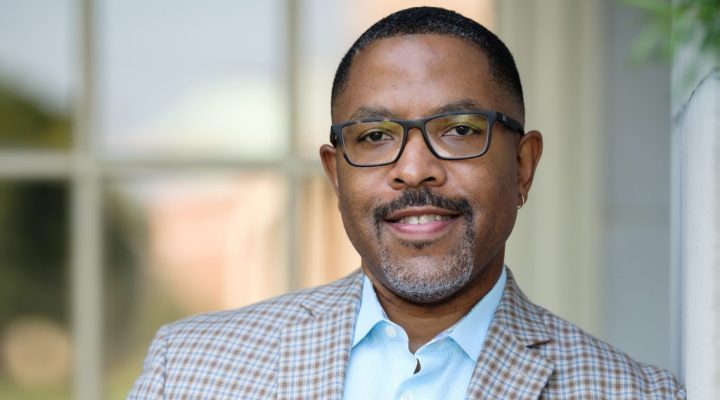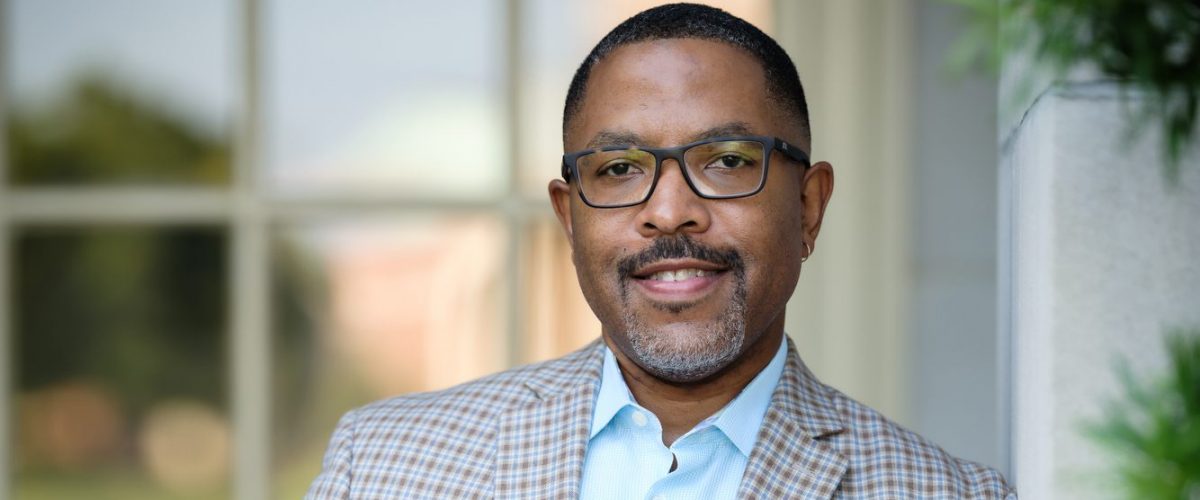Friends and colleagues have sometimes considered Corey D.B. Walker, the new dean of Wake Forest University School of Divinity, as somewhat of an academic jack-of-all-trades given his extensive research, writing, teaching and higher education leadership experience.
“A lot of people think I am doing a lot of different things, but the truth is I have been doing one big thing, and that is responding to the depth and the continuing evolution of my calling to use the gifts God has given me to expand the wide ‘circle of we’ and what it means to be human in the world and to be human in relation to God,” said Walker, who is an ordained American Baptist minister.
Walker was named to lead the divinity school Sept. 1 after serving as interim dean since January. He joined the university’s faculty in 2020 as professor of the humanities and as inaugural director of the program of African American studies, a position he will hold until the end of the academic year. He has held numerous other faculty and academic leadership positions, including vice president and dean of the Samuel DeWitt Proctor School of Theology at Virginia Union University in Richmond, Va. He is the author of A Noble Fight: African American Freemasonry and the Struggle for Democracy and is currently writing a book about Wyatt Tee Walker, a pioneer in the Black freedom movement.
“Corey Walker is a remarkable leader whose impressive record of scholarship and administrative leadership inform his compelling vision for graduate theological education,” said Wake Forest President Susan R. Wente. “Dr. Walker has served with distinction as interim dean, and I am confident he will effectively lead Wake Divinity in strengthening its impact and reach as a catalyst for good in society.”
Search committee member and associate professor Elizabeth Gandolfo said Walker has the skills needed to lead a diverse theological institution: “Corey Walker is an accomplished teacher, scholar and administrator who is committed to a broad vision of theological education that honors the humanity of all people and the well-being of the planet as a whole.”
“As a community, we are in the midst of transforming and renewing our vision of theological education.”
One of the biggest challenges before the seminary is ensuring its curriculum continues to adapt to the ever-changing demands of 21st-century ministry and the evolving needs and interests of its students, Walker said. “As a community, we are in the midst of transforming and renewing our vision of theological education.”
The transformation includes welcoming the divinity school’s first doctoral students in fall 2024. “This is very exciting. For our first 25 years, we offered just one degree, the master of divinity,” he explained.
Another move was the recent announcement that Louisville Presbyterian Theological Seminary’s former president, Alton B. Pollard III, will join the Wake Divinity faculty in the James and Marilyn Dunn Chair in Baptist Studies. “It’s an amazing achievement just to have someone of his scholarly status come back to Wake Forest University where he began his career,” Walker said.
Another adaptation is providing cross training in theological education and media, law, health and community renewal and development, Walker said. “We are seeing a deepening of those trends at Wake Divinity, and we already have joint programs such as divinity and law and divinity and counseling. We also have a faith coordinating center around HIV-AIDs.”
Those called to church settings need special preparation for entering environments vastly different from those of previous generations, he added. “Many of our students are going into ministry, but in congregations that are not as well equipped with diverse staffs as before.”
Theological education also must actively respond to the advent of global climate change because students will be dealing with the threat in whatever ministry field they undertake, he said. “Climate change is a crisis we are all dealing with, and including it in theological education is not an option anymore. We have to respond to this situation, which is a new moment in global history and human experience.”
Growing up in Black Baptist churches in Norfolk, Va., with numerous influential spiritual mentors and his early attraction to religious studies provided him the interpersonal and academic tools needed to lead an ecumenical seminary and to build community across the university, he said. “We are in dialogue with the law school, the business school, the medical school and the College of Arts and Sciences. These conversations are a nexus for understanding the ways in which the complexities of religion undergird and inform the multiple fields of study in our contemporary moment.”
His Baptist background has shaped him through all these years and experiences, he added.
“Examining what it means to be human in the world and in relation to God is not a narrow path to travel. It is a broad path, and everything I have done has prepared me for this moment to continue my calling at Wake Forest Divinity School.”


